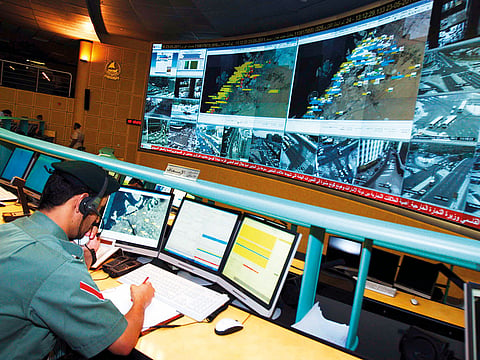Elderly man invites Dubai Police for lunch on 901
A staggering 70 per cent of non-emergency calls are being made to 999 instead of 901

Dubai: Dubai Police answer any call even if it’s bizarre, like the one where an elderly man invited officers to lunch. They would, however, much prefer to receive strange requests on 901 rather than 999 to alleviate pressure on the emergency line, it was announced on Tuesday.
Last year the non-emergency line received just 541,722 calls while 999 received 5,351,009 calls, but Major General Kamel Butti Al Suwaidi, Director of the Operations Department of Dubai Police said more than 70 per cent of the calls coming on the emergency line were non-emergency in nature. That, he said, was a high percentage compared to other countries like the US, where non-emergency calls on the emergency line contribute just 20 per cent.
This trend has continued even after police set up 901 in October 2010 to alleviate pressure on 999, hence why Dubai Police are issuing this latest reminder.
“Despite the number of callers on 901 rapidly increasing each year, many people are still calling 999 for non-emergency matters,” said Al Suwaidi. “The public should understand the difference between 901 and 999 and be more mindful of the calls they are making to the hotline,” he added, during the launch of a 901 awareness campaign at Dubai Police Headquarters in Al Ghusais on Tuesday.
We have quick answer service when calling on 901. Public who need advice on security matters can call this number.Major General Kamel Butti Al Suwaidi, Director of the Operations Department of Dubai Police
A lunch call
Dubai Police said one of the calls to 901 came from a lonely old man who called asking for officers to join him for lunch as he was feeling lonely and wanted someone to chat with.
“A second can make a difference between life and death in emergency situations,” said Al Suwaidi. “And calling 999 for non-emergencies is a misuse. The majority of those calls are non-emergency, which is overburdening the system and wasting our resources.”
Al Suwaidi urged parents, schools and universities to teach students the difference between 999 and 901.
He said that the non-emergency number provides 32 services to the public ranging from traffic to community requests.
“We have quick answer service when calling on 901. Public who need advice on security matters can call this number,” said Al Suwaidi.
Top calls to 901 were for traffic related matters with 55,752 calls, while 41,048 were from people who wanted addresses and numbers for specific police stations or departments.
“We received 18,624 calls to contest a traffic fine and 16,268 calls for paying traffic fines and checking how to pay them. The non-emergency number received 6,612 calls to report e-crimes last year,” added Al Suwaidi.
Meanwhile, Butti Al Felasi, Director of the Security Awareness Department of Dubai Police, said the campaign entitled ‘Don’t put their lives on hold’ will continue throughout the year to instruct people to use 901 for different enquiries and services instead of 999.
“The campaign will include posts on social media and have open dialogue with the public through a range of platforms. We will also put up posters in residential areas. People should keep in mind that by calling 999 for non-emergency matter, they delay police response times to emergency situations,” added Al Felasi.
Sign up for the Daily Briefing
Get the latest news and updates straight to your inbox


